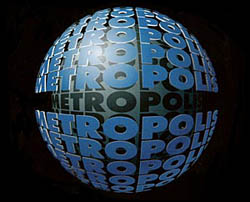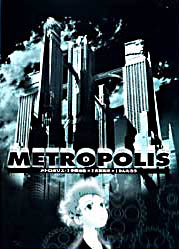by Luis Reyes
 |
|||||
|
Originally slated for November 9, Osamu Tezuka's Metropolis directed by veteran anime director Rintaro (X, Galaxy Express 999), written by famed animator Katsuhiro Otomo (Akira) and released domestically by Sony/Tristar will hit screens in key cinema markets on January 25, 2002, a little over 19 weeks after the tragedy that befell New York in September. The film opening's proximity to the events of Sept. 11 is relevant in so much that the film features a metropolitan tragedy that could surface painful echoes of the World Trade Center collapse. Though the context of the film's climax is far removed from a terrorist agenda, it still points at themes vital to our understanding of why such things even happen.
Metropolis' delay is endemic of Hollywood's rash of knee-jerk yanking across the entertainment spectrum. Episodes of television shows were either edited or delayed. Top brass scalpeled films exhibiting even a frame of the World Trade Center, including the upcoming Spider-Man. In an entertainment climate that feared being insensitive to a country in grief (and concerned that their blockbusters would come in under par in such a climate), industry executives decided to pretend that these things don't exist. Yes, a cautionary delay of a series or a film immediately after the Sept. 11 tragedy was probably a good idea. However, now it's time to increase the discourse. Instead of television and film sensationalizing these things, perhaps the public will be drawn to understanding why these things happen in a broader context. And that is what, prophetically, Tezuka's Metropolis proposes.
Tezuka began his career shortly after World War II having laid witness to the single most destructive metropolitan catastrophe the world had and has since ever known. Nearly 300,000 people lost their lives when Little Boy and Fat Man rained down on Hiroshima and Nagasaki respectively in August of 1945. Akin to Americans after Sept. 11, the Japanese population sank into a deeply self-reflective period, and began to associate developments in technology with the potential for the creation of an even greater destructive tool. Tezuka wanted to feature humanity in contrast to technology, increasing the sensitivity we all have to people in pain. Today Japan leads the world in environmental legislation, the protection of fundamental freedoms, encouraging peace talks globally and a litany of other global agendas aimed at harmonious co-existence. It's second only to the US in the amount of money it gives to the United Nations and, despite an economic pitfall in 1997, has jockeyed for a substantial part on the world stage.
For the US, globalization - an expanded form of technology - is that which has desensitized its population to humanity abroad, and the collapse of the World Trade Center that has immersed the US population in a period of self-reflection. We have all discovered that we are more capable of destroying ourselves the farther we drift from our humanity, blind to human suffering. Everyone wants to kill each other now, and the people that want peace to take root are not necessarily those personally touched by the tragedy. The crisis in Israel is spinning out of control, a prescription for national security in the form of more missiles has already displaced impassioned pleas for global unity, and our civil liberties, the very thing that make us patriotic Americans, are at the threshold of extinction. Tezuka's Metropolis is a police state, mechanized to the hilt with little distinction between its inhabitants and the mechanized machines that do their dirty work - the population is told what to think, how to feel, what to buy and what its relationship with power must be (sentiments echoed by President Bush and Attorney General Ashcroft in the actions they've taken over the last few weeks). But the tragedy of Metropolis opened its eyes to its humanity. Perhaps Tezuka would ask us to do the same now.
|
|||||
|
Metropolis © Osamu Tezuka / Sony.
|
|||||

